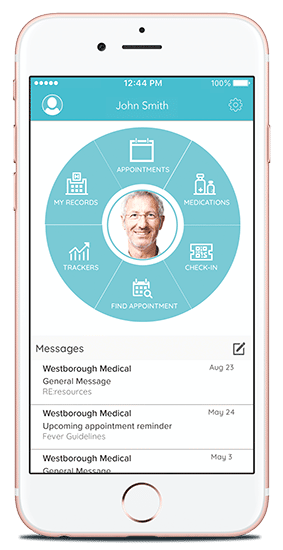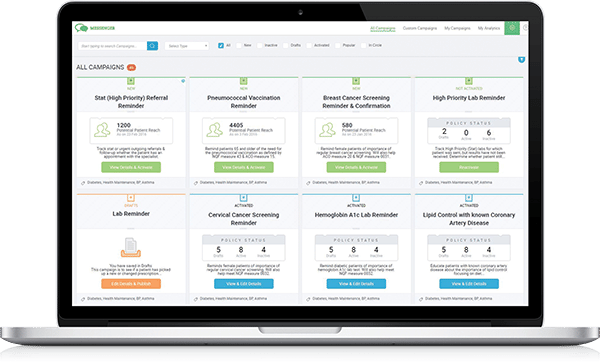Published on Wednesday January 10, 2018
In this episode of the eCW Podcast, Dr. Amar Shah shares how Patient Relationship Management Services from eClinicalWorks transformed his primary care practice. Customized marketing materials and training have meant that a remarkable 60% of the practice’s patients are now using the healow Patient Portal, far ahead of national averages for similar Patient Engagement products.
“[Prime Care Family Practice] had on-site training with two eCW trainers who had one-on-one contact with my staff, teaching them about the healow app, how to activate it, how to get patients on it, and how to tell them about the services on the healow app and what value it can bring them.”
Amar Shah, MD

Topics From This Episode
healow
Dr. Amar Shah admits that, at first, his staff were slow to adopt healow. The game changer came when he assigned “healow champions” among the front desk, medical assistants, providers, and administrators. The champions were responsible for showing patients how to download and activate healow, and made sure — before the patient left the office — that they were comfortable logging in and viewing their visit summaries, reminders, and patient education. Now, adoption rates have soared to over 60%, far ahead of industry averages.

Messenger
Prime Care Family Practice is making effective use of Messenger campaigns, which Dr. Amar Shah says has been an effective way to highlight the quality of the work his practice does. They get valuable feedback by sending Messenger campaigns to their patients, which leads to actionable change and higher quality care.

Transcript:
Brian Sahl: Good morning, and welcome to another eCW Podcast. I’m Brian Sahl, and today we’re broadcasting live from the 10th annual eClinicalWorks National Conference. With me today is Amar Shah, a doctor from Prime Care Medical in Virginia. Welcome, doctor.
Amar Shah: Thank you.
Brian: Today we’re going to be talking about patient relationship management and all that that entails. So, doctor, I guess I’d like to start off by asking you how do you personally define patient relationship management?
Amar: Well, first of all, Brian, thank you again for letting me tell our story. I’ll give you a little bit of background about myself and who I am, and that kind of lead-in to that narrative a little bit better. So, I’m a primary care physician. I’ve been practicing for 10 years. I own my own primary care practice, and we’ve been using eClinicalWorks since 2012. And since then we’ve had an evolution or transformation of our practice for the last five years. About a year and a half ago, we noticed a really big deficiency in our patient engagement strategy. And in terms of patient engagement, what that meant to us was that we noticed that patients only used the telephone to call our office. They had limited access in terms of trying to get ahold of the doctor or medical assistant, or even make an appointment. And we had complaints from our front desk, from our medical assistants, from our providers, and obviously the patients, that we were just not readily accessible.
Brian: So as you said, that’s a problem that I think you’ll find in many practices, is that the telephone is the primary conduit for data going in and out to patients. But we both know that there — I don’t want to say more efficient, but certainly additional avenues that you can go down to make sure that you are in constant contact with your patients.
Amar: We initially had an initiative to get everybody on the Portal, ask for an email, get them web-enabled. But the value wasn’t really seen well initially, because patients would log in, then they would never log in again, they’d lose their usernames, they’d lose their passwords, and we never really saw a robust use of the Portal. So, a year ago we actually met Sandra Borenstein here at the Conference, and she told us about Patient Relationship Management Services, and then we were enticed into let’s make a commitment to improve our engagement stategy, and so we did. And that truly has changed our practice.
Brian: That’s great to hear. What opportunities or what did they do to help you, I guess, is really what it comes down to?
Amar: It was fairly intensive at first. There were numerous phone calls and emails regarding marketing. And we developed some customized marketing material with our practice logo, and then messages that truly meant value for our personal practice and our personal providers and our patients, because we believe that healthcare is local. My same practice in California has different values and goals and patient ideas than my practice in Virginia. So, we customized those materials and placed them in strategic areas of the office. And then we had on-site training with two eCW trainers who had one-on-one contact with my staff, teaching them about the healow app, how to activate it, how to get patients on it, and how to tell them about the services on the healow app and what value it can bring them.
Brian: Using the healow app, did you get a lot of acceptance for that? Were people willing to drop it on their phones and actually go to town with it?
Amar: you know, they initially were not. But the game changer was that we assigned healow champions at our front desk, medical assistants, providers, and our administrators. And those champions actually helped show the patient in the office how to download it, how to activate it, and what the features were before they left the office, and they said ‘Look, you are ready to go. Here’s your visit summary, here’s your patient education, and here’s your appointment reminder, all on your phone. And you only needed a four-digit code to log back in.’
Brian: That sort of hands-on, personal experience with someone in the office I can see as being absolutely invaluable in getting adoption rates way, way up. What do you find patients are using most on the healow? Just looking at their records? Are they messaging you?
Amar: The main thing was that we drove messages and prescription refills. That was a focus of ours, because our phone lines were just inundated with messages. We had dated message discrepancy from transcribing errors, and just a backlog of messages for the medical assistants. When we did this, we targeted on refills and just phone messages, and we saw a 7,000 number reduction in phone calls over the last year. So that was an amazing number for us.
Brian: As you mentioned with transcription issues, it really is a patient safety issue as well, where the patient misreads the milligrams and so forth and so on when you’re putting it in, but you know if you’re getting it directly back from healow you’re getting the exact prescription, you’re getting it properly.
Amar: Exactly. And we’ve had patients who are out of the state. They’re in California on vacation, and they run out of their prescriptions. And I tell them, ‘Look, it’s portable. Just get on your phone, send me the refill request, and I will send it to the pharmacy that’s in California for you.’ And it’s been a life-saver for a lot of our patients.
Brian: Oh, that’s great. Overall, then, it sounds like your experience has been very, very positive with patient relationship management, working alongside with eClinicalWorks. We’ve talked about a little bit of the benefits that you’ve seen. Can you expand on that a little bit? More of the benefits that you might have seen?
Amar: Certainly. One of the bigger benefits we’ve noticed is an improvement in our quality. So we are part of a Clinically Integrated Network in Virginia called Virginia Care Partners. I’m actually the medical director of the network. And we have an initiative to reduce costs, improve quality, and reduce overutilization. And we send out quality metric data to practices, and our practice is one of the top performers in the network, and our performance has really significantly increased over the last one year because of patient engagement, and improving our ability to have non-face-to-face patient engagement with our patients because of activating healow.
Brian: Are you using messaging at all?
Amar: We use messaging. We use the campaigns, as well. And that’s really been a great outreach. The campaigns have been a huge proponent to including our quality, because we actually get true value from those campaign messages being sent out, and we get feedback from the patient, and we can truly make actionable change, then.
Brian: Yeah, campaigns, I think, are very special because they not only give you the opportunity to contact the patient, but you also get the feedback from the app itself to say, well, we sent out 900 messages saying please come in and get your flu shot, 700 people opened it, and 600 people scheduled. So, you get some actionable data directly back from it.
Amar: I certainly agree. And I think that one of the data points that we had noticed was that we send out 800 messages for a flu campaign. How many of those messages actually got read? And we did a deep dive into the data, and we saw that only 3% of our messages that were sent out actually failed. The other 97% of messages were read, and about 60% of those messages, those patients actually came in and got their flu shot.
Brian: Wow, those are some great numbers.
Amar: Excellent, yeah.
Brian: Wow.
Amar: So, because we’ve had such great success, I have made an initiative for my network to try to help practices implement these types of changes in their own practices in the Richmond market. And our network actually has a large following with eClinicalWorks. There’s about maybe 50 to 60% of our practices in the network who use eCW. But they don’t know of the services that eCW provides, and so I’ve been making it somewhat of, I guess, a sojourn of mine to every practice — I go to about one practice every week who are somewhat lagging behind on some of their quality metrics — and I give them enlightenment. I tell them, look, turn on your eCW. Let me show you what you can do, and this is how you can work smarter for your practice, and not harder for your practice. And I have never subscribed to the notion that knowledge is power. I live by the fact that giving people knowledge and then reflection gives them wisdom. And that is our main goal at our network — is gaining wisdom. And that is what we want for our practices to develop.
Brian: What a wonderful philosophy! That is really, really wonderful. Well, doctor, thank you so much for joining us today. This is very, very insightful, and we really do appreciate your being here with us today. Thanks, again. This is Brian Sahl for the eCW Podcast. You can see additional eCW Podcasts on iTunes, YouTube, and my.eclinicalworks.com. So, from myself and Dr. Shah here at the 10th annual eCW National Conference, have a great day.





